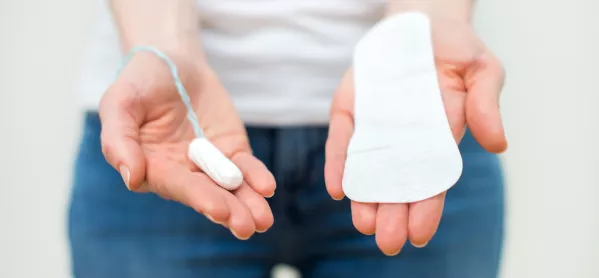- Home
- How to end stigma around periods? Put pupils in charge
How to end stigma around periods? Put pupils in charge

The Scottish government’s plan to provide free period products in all schools is not just about alleviating poverty - it’s about equality. The scheme is designed to allow greater access for all students who need them, not just those from low-income families. Now schools must make sure that pupils feel able to take the products.
Many schools have asked us how best to achieve this. The answer is this: put pupils in charge.
Recently, a schools’ conference in Glasgow demonstrated the power of allowing young people to lead this project. The event saw 150 pupils from secondary schools across the city gather in St Paul’s High, to hear from pupil representatives that have led the rollout. St Paul’s students organised and led the conference, confidently addressing a packed assembly hall to explain what has happened in their school.
Period poverty: Free sanitary products in schools and colleges may become a requirement
Research: Free sanitary products ‘misused’ by some pupils
Our view: The stigma of period poverty needs to end
Glasgow City Council has championed the government initiative to provide free period products from the beginning. It was one of the first local authorities to distribute Hey Girls products - running a pilot in four schools (including St Paul’s) last summer term - and it was the first council to bring together schools for a conference of this kind, putting pupils in the driving seat.
Free period products in schools
At St Paul’s, pupils decided where and how students could access free products. Sanitary pads are freely available in all female, disabled and gender-neutral toilet cubicles, with extras in PE changing rooms and pastoral care. Pupils explained that it was important young people could collect them in private and without having to ask a teacher. Students were also clear that more and better education around periods was needed at secondary level to reduce the stigma surrounding periods, and encourage people to take products if they needed them.
A full half of the morning was dedicated to how education can reduce stigma and increase the uptake of free products. Pupils made it clear that an assembly and a poster to inform female pupils about what is happening was not enough. Earlier in the term, S3 students (aged 13-14) received training to teach periods to S1 classes (aqed 11-12), and on Monday they delivered education activities to all the pupil delegates. Using the Hey Girls resources that they helped to design and test, pupils led a carousel of activities - including quizzes and “period bingo” - and an opportunity to explore menstrual cups and cloth pads.
Education is important because embarrassment is a huge barrier to take-up in schools across Scotland. Young people are very clear that they do not want to have to ask for pads and tampons from staff, instead preferring to collect them freely from toilets. Every school’s facilities are different, and pupils are best placed to understand the particular social dynamics of their toilets and decide how best to distribute products.
Pupils are also best placed to police the policy. Many schools are worried that pupils will waste pads and tampons if they are freely available - flushing them down toilets, sticking pads on the mirrors, and throwing tampons on the ceiling. It is true that this has happened in some schools, but only in schools where there has been no pupil engagement and no education. The lesson from schools like St Paul’s is that when young people own the project - even taking responsibility for restocking products - then they monitor and empower each other. This ensures that everyone has meaningful access to products.
With schools and local authorities across Scotland still exploring different ways of distributing products, it is really encouraging to see so clearly what can happen when pupils have a meaningful role in the process. The students from St Paul’s were confident, articulate, and rightly proud of what they had achieved in their school, and they have inspired other pupils from schools across Glasgow to follow their lead.
We hope that other local authorities will join in and champion pupil-led delivery. If they do, this policy will not only achieve increased access to free period products - it can also support a new generation of young people who are not embarrassed by their bodies.
Molly Brown is education programme manager for Hey Girls, a Scottish social enterprise that sells plastic-free period products on a “buy one, give one” basis, as part of a drive to end period poverty. Hey Girls provides learning resources and teachers to help teach confidently about periods
Keep reading for just £1 per month
You've reached your limit of free articles this month. Subscribe for £1 per month for three months and get:
- Unlimited access to all Tes magazine content
- Exclusive subscriber-only stories
- Award-winning email newsletters
